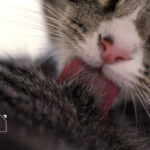Cat Girl Nuku Nuku, or All Purpose Cultural Cat Girl Nuku Nuku, began its life as a manga created by Yuzo Takada. Fans of supernatural manga might recognize Takada-sensei from his other notable works, 3×3 Eyes and Blue Seed. While Takada is known for his supernatural themes, Nuku Nuku takes a sharp turn into comedy. Originally a short manga with just three chapters in a single volume serialization, Nuku Nuku‘s popularity quickly expanded into three Original Video Animations (OVAs) – the first two often combined – a full TV anime series, and two subsequent sequels. But can an author celebrated for supernatural stories successfully navigate comedic territory? Let’s delve into All Purpose Cultural Cat Girl Nuku Nuku, focusing on the combined OVAs, to find out.
The story kicks off with a dramatic escape scene. Young Ryunosuke and his father are on the run, pursued by a menacing hovercraft. During their flight, Ryunosuke stumbles upon an injured kitten in an alleyway and, in a moment of compassion, decides to take it with them. Their getaway takes a chaotic turn when they crash their vehicle into a junkyard of crushed cars, momentarily losing their pursuers. However, the hovercraft pilot, in frustration, unleashes a barrage of gunfire into the pile of scrap metal. Miraculously, both father and son emerge unscathed, but the kitten is critically wounded. This is the point where the narrative shifts gears from tense action to outright silliness. In a rather unconventional move, Ryunosuke’s father, a brilliant but eccentric scientist, decides to save the kitten by transplanting its brain into a highly advanced android body. It’s revealed that their pursuers are actually employees of Ryunosuke’s mother, who is attempting to bring her son back to her. From this outlandish premise, the series launches into a collection of loosely connected, episodic adventures. These episodes center around Nuku Nuku’s hilarious and often awkward attempts to integrate into human society, coupled with the constant, often destructive, bickering between Ryunosuke’s estranged parents, frequently escalating into battles involving giant robots. Underneath the comedic surface, a narrative thread develops, charting the gradual reconciliation of Ryunosuke’s parents as they learn to understand and cooperate with each other, ultimately culminating in them having to work together for a common goal.
For those questioning the scientific plausibility of brain transplants into androids, it’s crucial to remember two key aspects of Nuku Nuku. First and foremost, it is a comedy. Secondly, the series never tries to present its science as realistic or even remotely believable. As a comedy, All Purpose Cultural Cat Girl Nuku Nuku is surprisingly effective. The scenarios are ripe with comedic potential, especially considering the limited runtime of the OVAs. Even the occasional serious moments are well-integrated within the overall comedic framework, providing brief respites and adding a touch of depth. The fight scenes are genuinely entertaining and often infused with humor, contributing to the show’s farcical nature. Nuku Nuku is a high-energy, over-the-top farce that offers considerable fun, particularly for viewers who can appreciate the more mature humor sprinkled throughout.
The strength of All Purpose Cultural Cat Girl Nuku Nuku isn’t solely in its outlandish plots; the characters are also remarkably well-developed for a comedy series. Ryunosuke’s parents, while often portrayed as flawed and even “terrible” at times, possess a level of complexity that makes them feel surprisingly genuine and human. Their blend of negative and sympathetic moments creates three-dimensional personalities that resonate with viewers. Ryunosuke himself, despite occasionally acting like a bratty child, is generally depicted as a sensible and grounded character, acting as a foil to the adults’ antics. Nuku Nuku, the titular cat girl, is a consistently amusing character. Her extreme naiveté and innocent worldview, stemming from her feline origins and new existence, are both believable and endearing. This innocence creates an interesting contrast with the shortcomings and flaws of the human characters around her. While the main trio is well-defined, the supporting cast, including Eimi, Kyouko, and Arisa, are somewhat less developed. Likely due to time constraints within the OVA format, these side characters, while present, don’t receive the same level of fleshing out as the central figures.
The art style of Nuku Nuku is distinctly representative of early 1990s anime. It shares visual similarities with other popular works of the era, such as Ranma 1/2. While perfectly acceptable and even charming within the context of its time, the animation style hasn’t aged as gracefully as some other series. There are instances where the art is used to exaggerate character emotions in a way that feels somewhat dated or ineffective by modern standards. One potentially detracting element for some viewers is the inclusion of fan-service moments, which occasionally feel excessive and unnecessary.
However, All Purpose Cultural Cat Girl Nuku Nuku shines brightly in its audio aspects. The voice acting is exceptionally strong. The cast, featuring renowned voice actors like Hayashibara Megumi, Shimazu Saeko, Ikura Kazue, and Kamiya Akira, delivers outstanding performances. While they occasionally employ exaggerated vocalizations, it’s never gratuitous or indiscriminate, unlike in some comedies like Baka to Test. In Nuku Nuku, the exaggeration is always purposeful and enhances the comedic effect. Similarly, the music score is excellent, effectively complementing the on-screen action and comedic timing.
For viewers interested in yuri themes, Nuku Nuku has a very subtle yuri element, rated at a 3/10. The characters Kyouko and Arisa share a few moments that hint at homoerotic undertones, and they are depicted as living together. However, the nature of their relationship is never explicitly confirmed within the OVAs, and these moments are too fleeting to be considered a significant aspect of the series.
In conclusion, All Purpose Cultural Cat Girl Nuku Nuku earns a solid rating of 8/10. While the overarching plot is secondary to the comedic scenarios, the dated art style may not appeal to all viewers, and the science is intentionally nonsensical, the humor is genuinely effective, the pacing is energetic, and the audio production is top-notch. Ultimately, for a comedy anime, these are arguably the most crucial elements. If you’re searching for a good laugh and appreciate retro anime humor, All Purpose Cultural Cat Girl Nuku Nuku is definitely worth a watch. All six OVA episodes remain highly entertaining and hold up surprisingly well even today.


